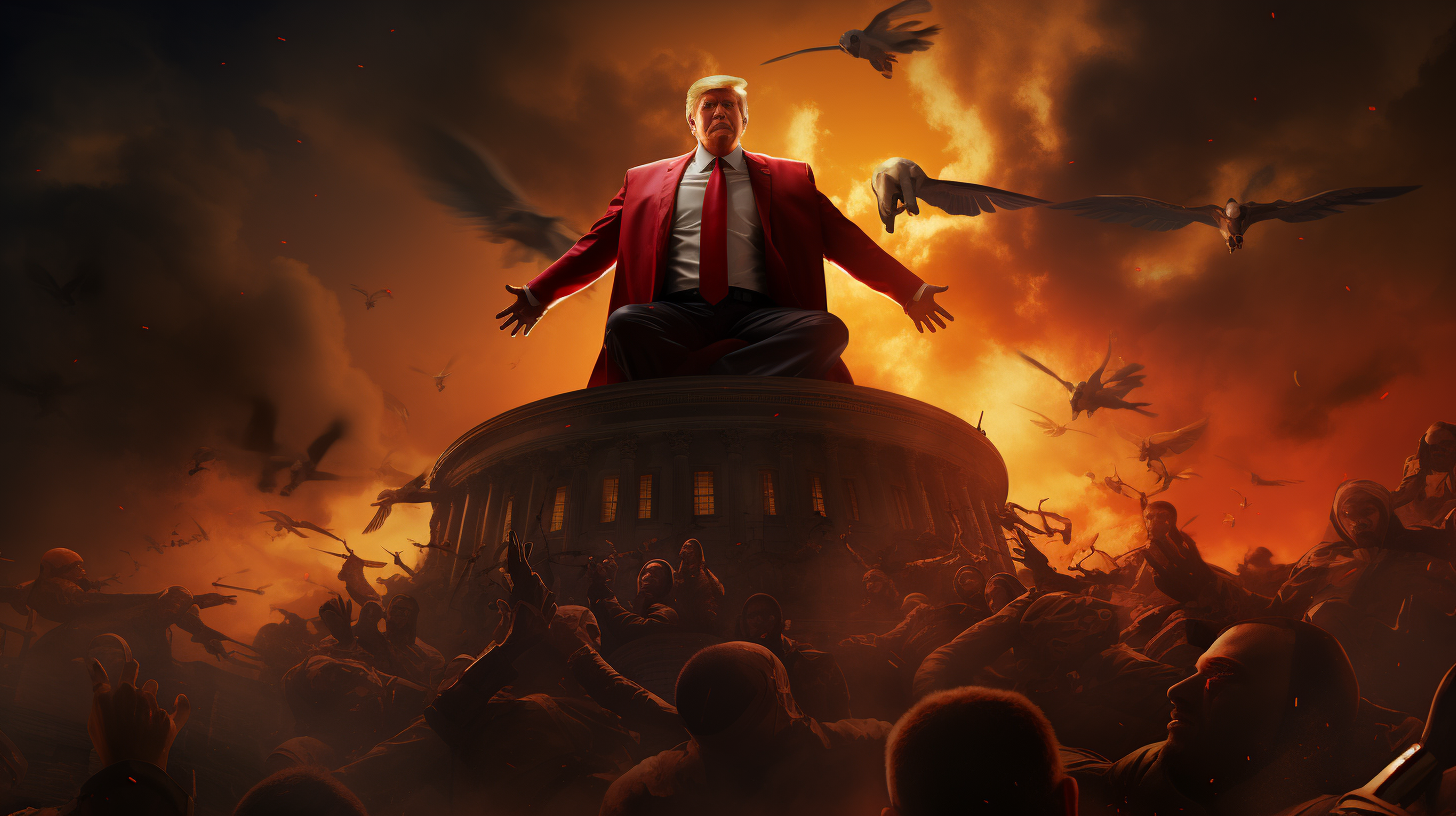
Exploring Notable Coup Attempts in History: Impactful Political Upheavals
In the annals of history, there have been numerous instances where ambitious individuals and groups attempted to seize power through force and subversion. These coup attempts have had far-reaching consequences, altering the political landscapes of their respective countries and, in some cases, reshaping the world order. Join us on a journey through time as we delve into the intriguing world of coup attempts, examining their motivations, outcomes, and lasting impacts.
MAGA (2021): A Modern Political Controversy
In recent years, the world witnessed a tumultuous event that gripped the United States and the international community’s attention. The storming of the United States Capitol in 2021 by supporters of the “Make America Great Again” (MAGA) movement marked a unique moment in American history, emphasizing the enduring relevance of coup attempts in the modern era.
This shocking event revealed the deep divisions within American society and the extent to which political polarization can lead to extraordinary actions. Supporters of then-President Donald Trump stormed the Capitol in a bid to overturn the results of the 2020 presidential election. It was a stark reminder of the potential for political violence to disrupt the democratic process.
The failed attempt to overturn the election results ultimately resulted in multiple arrests and raised questions about the fragility of democratic institutions. It also led to a second impeachment trial for President Trump, further highlighting the seismic impact of this coup attempt on American politics.
The Beer Hall Putsch (1923): Hitler’s Ascent Begins
Adolf Hitler and the Nazi Party embarked on a daring mission to overthrow the Weimar Republic in Germany. The infamous Beer Hall Putsch unfolded in Munich but ended in failure, leading to Hitler’s arrest and imprisonment. Little did the world know that this setback would serve as a stepping stone for his meteoric rise to power.
The Beer Hall Putsch marked Hitler’s first serious foray into national politics. Despite its failure, it garnered significant attention and support from right-wing nationalists sympathetic to Hitler’s cause. During his trial, Hitler used the courtroom as a platform to spread his extremist views, gaining notoriety and a growing following.
Hitler’s time in prison allowed him to write “Mein Kampf,” his autobiography and political manifesto, which would later serve as a blueprint for the Nazi Party’s policies. Upon his release, he continued to build his party and consolidate power, ultimately becoming the dictator of Germany in 1933. The Beer Hall Putsch, though unsuccessful, played a pivotal role in shaping the course of world history.
The Spanish Civil War (1936): Franco’s Rebellion
General Francisco Franco and a group of military officers orchestrated a coup against the elected Spanish Republic. While the coup achieved partial success, it ignited a protracted civil war that engulfed Spain until 1939, leaving a lasting impact on the nation’s history.
The Spanish Civil War was a brutal conflict that pitted Republicans, who supported the democratic government, against Nationalists, led by Franco, who sought to establish a fascist regime. The war attracted international attention and involvement, with Nazi Germany and Fascist Italy supporting Franco, while the Soviet Union supported the Republicans.
Franco’s Ascent and Spain’s Struggle
The war ended with Franco’s victory, and he established a repressive dictatorship that lasted until his death in 1975. The conflict left Spain deeply divided, and its scars are still felt today. The Franco regime’s legacy includes censorship, human rights abuses, and a long period of political isolation for Spain.
Kapp Putsch (1920): A Weimar Crisis
In the tumultuous era of Weimar Germany, right-wing forces under Wolfgang Kapp attempted to overthrow the government. The coup faltered when civil servants and workers staged a strike, causing the plotters to lose crucial support, thwarting their efforts.
The Kapp Putsch was a significant challenge to the fragile Weimar Republic. It was an attempt to establish a right-wing authoritarian government and undermine the democratic institutions established after World War I. However, the swift and determined response from civil servants, who refused to cooperate with the coup plotters, and workers, who went on strike, helped restore order.
This failed coup served as a lesson for the Weimar Republic, highlighting the importance of a strong commitment to democracy and the rule of law. It also revealed the potential for civil resistance to thwart anti-democratic movements.
The August Coup (1991): The Soviet Union’s Twilight
Hardline Communist Party officials in the Soviet Union made a bold move to overthrow President Mikhail Gorbachev in the August Coup. The attempt crumbled within days, hastening the eventual dissolution of the Soviet Union, marking a pivotal moment in world history.
The August Coup was a desperate attempt by conservative elements within the Soviet leadership to halt Gorbachev’s reforms and restore centralized control. However, their efforts backfired as mass protests erupted in major cities, and key institutions refused to support the coup. The coup collapsed, and Gorbachev returned to power, but the damage was done.
This failed coup accelerated the disintegration of the Soviet Union. It emboldened independence movements in Soviet republics, leading to their declarations of independence. By the end of 1991, the Soviet Union had dissolved, marking the end of the Cold War era and the emergence of independent states in Eastern Europe and Central Asia.
Turkey Coup Attempt (2016): Erdogan’s Survival
In a shocking turn of events, a faction within the Turkish military sought to topple President Recep Tayyip Erdoğan’s government. Loyalist forces and civilians rallied against the coup plotters, ensuring the failure of their endeavor.
The 2016 coup attempt in Turkey was a dramatic moment in the country’s modern history. A faction within the military, claiming to act in defense of democracy, launched a coup against President Erdoğan’s government. However, the coup quickly unraveled as thousands of citizens took to the streets in support of Erdoğan.
Erdoğan’s government blamed the coup on a movement led by Fethullah Gülen, a Turkish cleric living in exile in the United States. The aftermath of the coup saw a significant crackdown on perceived Gülen supporters and political opposition, raising concerns about human rights and the rule of law in Turkey.
The failed coup solidified Erdoğan’s grip on power, leading to constitutional changes that expanded the presidency’s authority. It also strained Turkey’s relations with the United States and other Western allies.
Venezuelan Coup Attempt (2002): Chávez’s Resilience
Venezuela witnessed a brief coup attempt against President Hugo Chávez. Although Chávez was briefly ousted, mass protests and international pressure swiftly restored him to power, underscoring the importance of popular support.
The 2002 coup attempt in Venezuela was a tumultuous episode in the country’s modern history. A coalition of military officers and opposition leaders temporarily removed President Chávez from office. However, their hold on power was short-lived, as massive protests erupted in support of Chávez, and international pressure mounted.
Chávez, a charismatic populist leader, was known for his socialist policies and anti-American rhetoric. His return to power after the coup strengthened his resolve to pursue his political agenda, which included controversial land reforms and nationalization of key industries.
The events of 2002 highlighted the deep political polarization in Venezuela and set the stage for years of political and economic instability in the country. Chávez’s presidency continued until his death in 2013, but the legacy of the coup attempt still influences Venezuelan politics.
Fiji Coups (1987 and 2000): Turbulence in Paradise
Fiji, often seen as a tropical paradise, experienced two military coups in 1987 and 2000, shaking the nation’s stability and reputation.
The 1987 coup, led by Lieutenant Colonel Sitiveni Rabuka, targeted the Indian-Fijian community’s political influence. It resulted in the ousting of the elected government and the suspension of the 1970 constitution. The coup strained ethnic tensions in Fiji and had long-term consequences, including political instability and international isolation.
The 2000 coup, led by George Speight, was motivated by nationalist and indigenous Fijian interests. Speight and his supporters stormed the Fijian parliament, taking hostage the elected government, including Prime Minister Mahendra Chaudhry. The coup resulted in Chaudhry’s removal from office and further instability in Fiji.
Both coups highlighted the ethnic divisions and power struggles within Fiji’s society. The nation continues to grapple with these challenges in its quest for stability and reconciliation.
Chilean Coup (1973): Allende’s Tragic Fall
The Chilean military, with the covert support of the United States, orchestrated a coup that toppled President Salvador Allende’s government in 1973. Allende lost his life, and General Augusto Pinochet took the reins of power, marking a dark chapter in Chilean history.
The Chilean coup of 1973 had profound and enduring consequences for the nation. President Allende, a socialist leader, had sought to implement significant social and economic reforms, but his government faced opposition from various sectors, including the military and business interests.
The coup, led by General Pinochet, resulted in Allende’s death and the establishment of a military dictatorship that would last until 1990. Pinochet’s regime was marked by human rights abuses, political repression, and economic liberalization.
The United States’ involvement in supporting the coup raised questions about American foreign policy and its role in shaping the destinies of other nations. The aftermath of the coup left deep scars on Chilean society, and the country continues to grapple with the legacy of that period.
These coup attempts, each with its unique set of circumstances, actors, and consequences, have left an indelible mark on the nations they affected. While some led to enduring changes in leadership, others resulted in protracted conflicts or the dissolution of entire countries. The stories behind these events offer valuable insights into the complex and unpredictable world of politics and power struggles.
In conclusion, history is replete with instances of individuals and groups striving to reshape their nations through coup attempts. These endeavors have had a profound impact, shaping the course of history and leaving a legacy that continues to resonate in the present day. From the Beer Hall Putsch to the storming of the U.S. Capitol, these events remind us of the enduring human drive for power and the lasting consequences of political upheaval.
Learn More:
BBC News – Failed Coups: The BBC offers a comprehensive collection of news articles and analyses on failed coup attempts from around the world. You can find historical accounts and recent developments related to coup attempts. Explore their coverage of failed coups at BBC News – Failed Coups. https://www.bbc.com/news/world-africa-60289571
The Washington Post – Coup Attempts: The Washington Post provides articles, analysis, and commentary on coup attempts and their implications. Their coverage often includes expert opinions and historical context. Visit The Washington Post’s section on coup attempts at The Washington Post – Coup Attempts. https://www.washingtonpost.com/opinions/2023/06/28/supreme-court-independent-state-legislature-theory-trump-2024/
GlobalSecurity.org – Coup d’État and Attempted Coups: GlobalSecurity.org offers a repository of information on coup d’état and attempted coups, including historical examples and analyses. You can find detailed profiles of various coup attempts and their outcomes. Explore their resources on coup attempts at GlobalSecurity.org – Coup d’État and Attempted Coups. https://www.globalsecurity.org/
